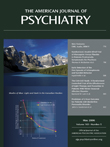Prediction of the 10-Year Course of Borderline Personality Disorder
Abstract
Objective: The purpose of this study was to determine the most clinically relevant baseline predictors of time to remission for patients with borderline personality disorder. Method: A total of 290 inpatients meeting criteria for both the Revised Diagnostic Interview for Borderlines and DSM-III-R for borderline personality disorder were assessed during their index admission with a series of semistructured interviews and self-report measures. Diagnostic status was reassessed at five contiguous 2-year time periods. Discrete survival analytic methods, which controlled for baseline severity of borderline psychopathology and time, were used to estimate hazard ratios. Results: Eighty-eight percent of the patients with borderline personality disorder studied achieved remission. In terms of time to remission, 39.3% of the 242 patients who experienced a remission of their disorder first remitted by their 2-year follow-up, an additional 22.3% first remitted by their 4-year follow-up, an additional 21.9% by their 6-year follow-up, an additional 12.8% by their 8-year follow-up, and another 3.7% by their 10-year follow-up. Sixteen variables were found to be significant bivariate predictors of earlier time to remission. Seven of these remained significant in multivariate analyses: younger age, absence of childhood sexual abuse, no family history of substance use disorder, good vocational record, absence of an anxious cluster personality disorder, low neuroticism, and high agreeableness. Conclusions: The results of this study suggest that prediction of time to remission from borderline personality disorder is multifactorial in nature, involving factors that are routinely assessed in clinical practice and factors, particularly aspects of temperament, that are not.



